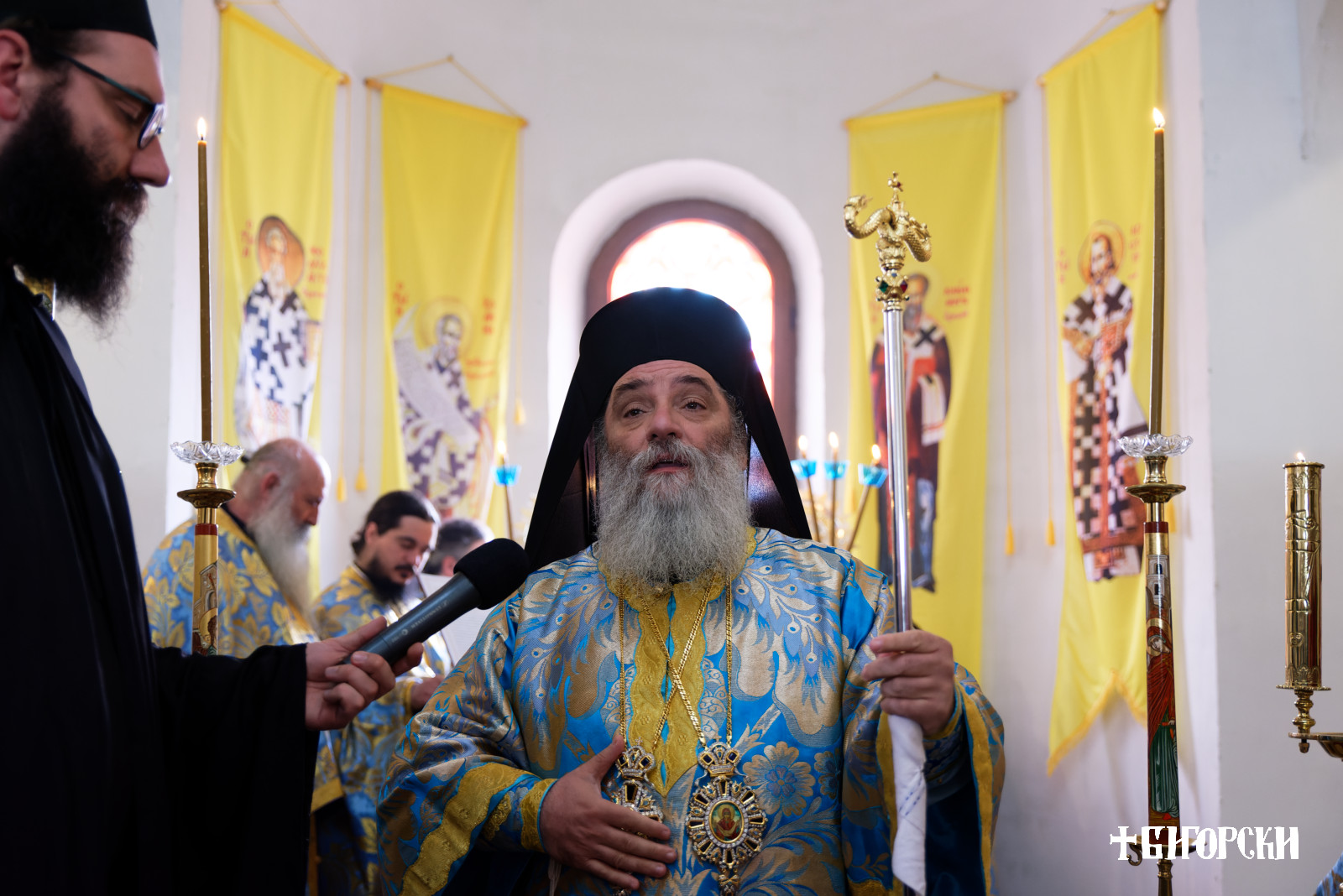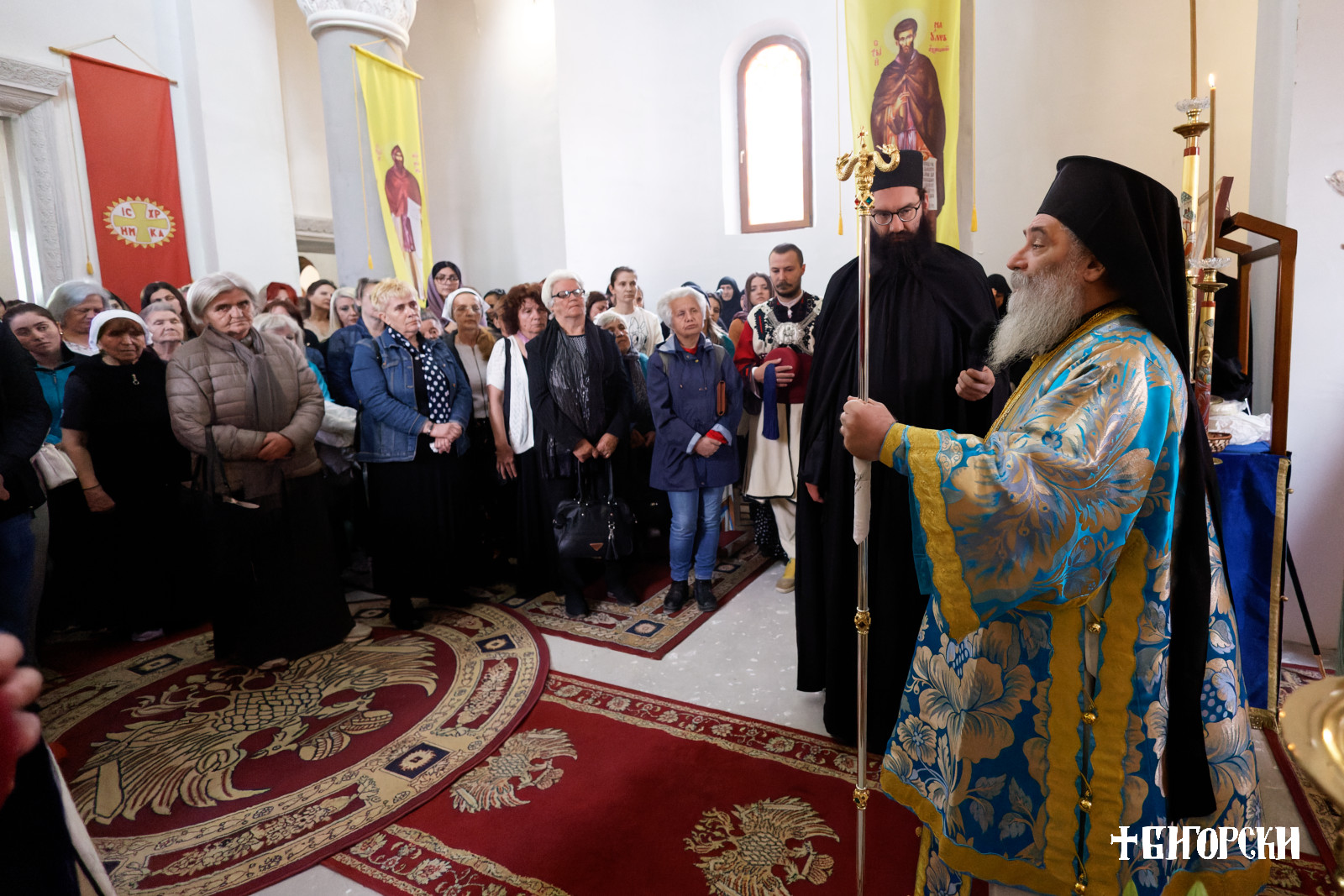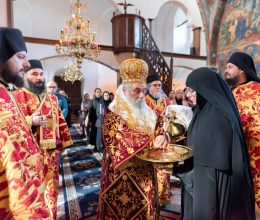
In the name of the Father, and of the Son, and of the Holy Spirit!
Reverend Fathers,
Honored members of the pious Dzhikovski family, benefactors of this sacred temple,
Beloved faithful,
Today, we celebrate the memory of our holy forefathers and enlighteners, the divine Saints Cyril and Methodius, the equal-to-the-apostles and teachers of the Slavic nations. By the grace of the Church’s liturgical calendar, we also commemorate today the Apodosis (leave-taking) of the central feast of our Holy Church—the Resurrection of Christ, the Holy Pascha. Therefore, throughout today’s service, just as on Easter itself, we have sung many times the triumphant hymn of the Resurrection.
Thus, today’s grace is twofold: we glorify the glorious Resurrection of our Savior Christ, accompanied by the festive hymns in honor of our divinely wise spiritual fathers. One joy enriches the other. And this is entirely appropriate, for who else, if not the Apostles, Martyrs, and Saints of God, are the witnesses of the Resurrection—of this incomprehensible, all-saving event? Today’s celebrated saints, the great enlighteners and teachers, throughout their entire earthly lives and even now, continue to proclaim the Resurrection of Christ: through their wise words, through their praiseworthy deeds, and through their God-inspired lives. True witnesses, martyrs for the Word of Christ, they became the flawless expression of God’s Word by remaining unwaveringly obedient to the Holy Church.
History testifies that the Holy Brothers, in obedience to the Holy and Great Church of Christ in Constantinople, and by the command of the Holy Patriarch Photios the Great and the Byzantine Emperor Michael, took upon themselves the martyr-like cross of enlightening the Slavic peoples and many others who dwelled in darkness. For life without Christ is nothing but darkness. These unenlightened peoples had neither the true faith, nor civilization, nor written language. They were the people about whom the prophet Isaiah spoke: “The people walking in darkness have seen a great light; on those living in the land of the shadow of death, a light has dawned” (Isaiah 9:2).

These two divine men, raised in the light of the Orthodox Byzantine Empire, embarked zealously to preach the Holy Trinity among the unenlightened and barbarous peoples. They were sent by the emperor not with military force, nor with human tools, nor with political power, but with what they had been perfectly armed and trained in from their youth: the Word of God, Christ in their hearts, and the wisdom of God on their lips like a sharp sword—that is, the spiritual sword, which is the Word of God (cf. Ephesians 6:17). The emperor knew that their weapon was incomparably more powerful than any earthly armament and that through it, they could perform a sacred task—drawing the hardened peoples toward God and transforming fierce men into sons of God.
Indeed, our holy first-teachers Cyril and Methodius accomplished a glorious and immortal work, first in the Moravian regions—modern-day Czechia and Slovakia—and from there, in many other lands and among other nations. Though they were supported by a great and mighty empire, they shared the same fate as the Apostles, being sent like lambs among wolves (Luke 10:3). They endured many hardships and severe persecutions, primarily from the heretical Trilingualists, who falsely taught that the Gospel could only be preached and the divine services conducted in three languages—Hebrew, Greek, and Latin—the languages of the inscription on the Cross of Christ at Golgotha. This kind of ethno-nationalist heresy regarded all other languages as unworthy of glorifying God’s name.
However, the holy brothers from Thessaloniki, nurtured in the Orthodox and right-believing environment of the Byzantine Empire, knew well and had embraced with their hearts the evangelical command of the Savior, who, sending forth the Apostles after His Resurrection, said: “Go, therefore, and make disciples of all nations, baptizing them in the name of the Father, and of the Son, and of the Holy Spirit” (Matthew 28:19). On Holy Pentecost, Christ sent the Spirit of understanding upon the Apostles, enabling them to comprehend the deep and hidden things of His wisdom (cf. Psalm 50), and to speak in various languages, even though they had no prior education in them.
Receiving the apostolic spirit from Christ, Saints Cyril and Methodius persevered through their martyric mission, succeeding in inscribing a new Christian history in the hearts of the Slavic peoples. They created a new world in Christ within the hearts of our ancestors, making them “a chosen generation, a royal priesthood, a holy nation” (1 Peter 2:9). Strengthened by the prayers of his brother, the monk Methodius, Saint Constantine—Cyril the Philosopher, who possessed exceptional wisdom and knowledge of many languages—created a written script so that the Holy Scriptures could be translated into a language understandable to the Slavs.
The very first words he translated and inscribed with these new letters were the opening verse of the Gospel according to Saint John the Theologian: “In the beginning was the Word, and the Word was with God, and the Word was God” (John 1:1).
The Holy Brothers, our Christ-loving teachers and fathers, created the written word in obedience to the Church of God, to enlighten and elevate us. They gave us this gift not so that we could plunge into darkness or tear one another apart, killing each other spiritually, but so that we might become illuminated. In ancient times, the written word was both a privilege and a responsibility reserved only for those called to use it for the benefit of all. Writing was entrusted to educated people who bore within themselves the image and likeness of God—people who were truly worthy to write and who used their work to positively influence society. Throughout history, the Church has labored tirelessly to educate and cultivate the people, establishing schools so that they might read the Word of God and be enlightened by it. Literacy was meant to help people become a new creation in Christ (2 Cor. 5:17) and not to be misused as a tool for harming others through deceit, insults, or slander.
The written word, above all, is sacred—created for holy purposes. Unfortunately, we now see this precious gift, left to us through the great effort and martyric sacrifice of the Holy Brothers and their disciples, being terribly desecrated. This sacred heritage is being used to mock others, to spread vile words. People take it upon themselves to use the written word to defame others—writing against bishops, priests, monks, the Church itself, and their own brothers and sisters. When something holy is used for unholy purposes, that is called sacrilege and blasphemy.
Beloved, today’s Gospel reading on the feast of saints reminds us of our calling to be light, not darkness. Each of us is called to participate in the Church’s mission to spread Christ’s light. And we can only do this if we first acquire spiritual light within ourselves. By correcting ourselves, we can, through personal example, inspire change in others. What matters most is that we approach others with love. Only love can transform a person—nothing else. This is how our beloved Savior acted. With the greatest love, He reached out to a fallen and embittered humanity, going so far as to allow Himself to be mocked, spat upon, to suffer, and to be crucified for our sake. Humanity at that time was in a state of deep moral decline—a fact attested by the philosophers and thinkers of that era.
Some people lived in complete darkness, governed by base, animal instincts; others, including those from so-called civilized societies, as pagans and idol-worshippers, were not much better. A philosopher once despairingly declared: “Either God must descend among men, or mankind will utterly perish.” Thus, when humanity was at its lowest spiritual state, the Savior came and visited us. And if He did not condemn the world but chose to be crucified for its salvation, who are we to judge others? Was it not He who said: “Do not judge, so that you will not be judged” (Matt. 7:1)?
Christ established His Church upon His own blood, upon the blood of the martyrs, and upon the spiritual labors of God-bearing people like Saints Cyril and Methodius. For this reason, the Church is priceless. And we, as members of that Church, bear great responsibility for how we live and act. The degree to which others outside the Church may one day enter it depends in large part on us. Do not think that the world does not need Christ—it needs Him desperately. We are the ones who must show that here, within the Church, there is beauty; here lies the path to salvation; here, a person finds enlightenment and refinement. We can demonstrate this only by becoming true disciples of Christ—children of love and light.
We must follow the example of these Saints of God, who sacrificed themselves for the Gospel. To sacrifice oneself for the Gospel means to attain eternal life and the Kingdom of Heaven. Therefore, we too must labor for the Holy Gospel in order to inherit God’s Kingdom. In doing so, we will bring joy to those who, throughout our history, have worked tirelessly to inscribe the holiest message—the Good News of Christ’s Gospel—into the hearts of people.
May the blessing of the Holy Brothers, Cyril and Methodius, always be with us, for they are near to us at all times. All we need is to embrace their work, continue along the paths they showed us, and promise them that we will be good Christians—that only good and edifying words will proceed from our mouths. And those with the gift and calling to write, let them write only beautiful and uplifting things for the benefit and joy of the Church of Christ.
May you all be blessed!
Christ is Risen!















